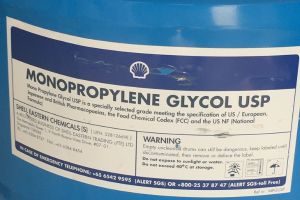Curious about the price for glycol disposal?
Request a free quote for current prices for disposing of glycol, coolant, and antifreeze. Our specialists will be happy to provide you with a competitive price proposal.
Disposing of glycol safely and correctly prevents environmental pollution and fines. Glycol, often used in coolants and antifreeze, is toxic and harmful and therefore considered chemical waste. Therefore, it is important to dispose of glycol correctly. Coolant disposal It's important to dispose of it through certified collectors. This article explains exactly what this liquid is, the regulations, how to dispose of it safely, and the costs involved.

Glycol is an organic compound (such as ethylene glycol or propylene glycol) used in coolants and antifreeze to lower the freezing point and improve heat transfer. When glycol becomes contaminated or deteriorates, it can contain harmful substances such as heavy metals, additives, or oil residues (read more about oil in coolant) contain. Therefore, old and used glycol-containing fluids fall under the category of hazardous and chemical waste.
The rates for disposing of glycol depend on:
The amount
The quality / degree of contamination
The type of packaging (barrels, jerrycans, IBCs)
The distance to processing locations
Frequency of collection
Would you like a personalized quote? Feel free to request a free, no-obligation quote from Chemisch Afval Nederland.
Because glycol is considered a hazardous substance, strict regulations apply for storage, transport, and processing. According to the Activities Decree and the Environmental Management Act, it may not be discharged via sewers, drains, or residual waste. This is because glycol/antifreeze is harmful if ingested, comes into contact with skin, or is inhaled. coolant dangerous and toxic. Collection must therefore always take place in accordance with the ADR guidelines for the transport and handling of hazardous substances.
Chemical Waste Netherlands operates in full compliance with these legal regulations. We ensure safe storage, proper transport, and certified processing of glycol and other chemical liquids. This ensures environmentally responsible disposal and ensures your company complies with all legal obligations.
In the acceptance guidelines of accredited processors, glycol is often listed as “Coolant / Glycol Mixtures” under the hazardous/chemical waste category.
At specialized processing facilities, glycol is separated, purified, and, if possible, reused. The processing takes place in several steps:
Pretreatment: removal of solid particles, oil residues and contaminants
Separation: Glycol is separated from water or other components
Purification: further cleaning to make the glycol suitable for reuse
Processing of residual materials: materials that cannot be reused are safely destroyed or processed in accordance with environmental standards.
This processing minimizes the environmental impact and ensures that residual materials do not end up in the environment incorrectly.
No, mixing glycol with other substances such as oil or chemicals makes processing more complex and can lead to rejection by processors.
No, glycol should never be discharged into the sewer or into residual waste. It is considered chemical waste and must be disposed of properly.
Yes, companies that use or dispose of glycol are subject to a legal duty of care. They must ensure proper storage, transport, and processing through certified collectors.
Even small quantities of glycol must be disposed of properly. We collect large and small quantities from businesses throughout the Netherlands. Individuals can drop off small quantities at their local recycling center or chemical recycling center.
Request a free quote for current prices for disposing of glycol, coolant, and antifreeze. Our specialists will be happy to provide you with a competitive price proposal.
